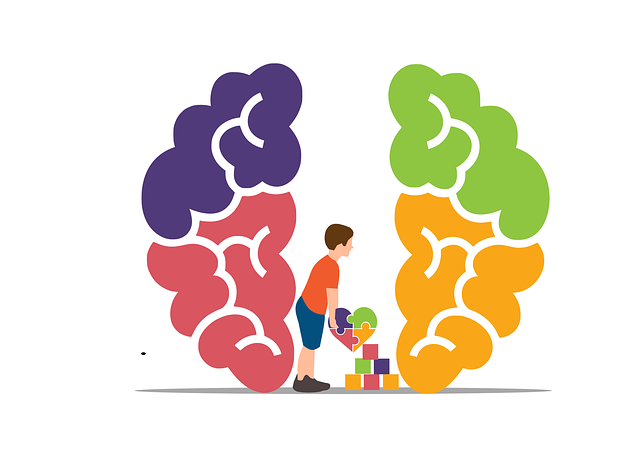Emotion regulation through techniques like cognitive reframing and mindfulness is crucial in Centennial Sexual Abuse Survivor Therapy (CSAT), empowering survivors to process trauma, manage intense emotions, and foster mental well-being. Therapists guide clients in identifying triggers, understanding emotional responses, and implementing personalized coping strategies, including group support through Community Outreach Programs. Mindfulness practices enhance self-awareness, helping survivors detach from distressing memories and future fears. Integrating cognitive reframing with journaling tracks thought distortions, promoting inner strength and balanced perspectives. The ultimate goal is to develop healthy coping mechanisms for both past trauma and current stressors, preventing mental health issues and enhancing overall well-being.
Emotion regulation techniques play a pivotal role in healing for Centennial sexual abuse survivors. This article explores how therapists can empower individuals to manage their emotional responses effectively. We delve into key strategies, including mindfulness practices for increased self-awareness, cognitive reframing to challenge distorted thought patterns, and building resilience to navigate triggers and stressors. By understanding the impact of emotion regulation on healing, therapists can provide vital tools for survivors’ long-term well-being.
- Understanding Emotion Regulation and Its Impact on Healing
- The Role of Therapists in Teaching Effective Techniques
- Centering on Self-Awareness: Mindfulness Practices for Survivors
- Cognitive Reframing: Challenging Distorted Thought Patterns
- Building Resilience: Strategies for Managing Triggers and Stressors
Understanding Emotion Regulation and Its Impact on Healing

Understanding emotion regulation is a pivotal step in healing for Centennial Sexual Abuse Survivor Therapy (CSAT) clients. It involves recognizing and managing emotional responses effectively, which can significantly impact overall mental wellness. In the context of CSAT, this process is crucial as it helps survivors navigate and process complex emotions resulting from traumatic experiences. By learning to regulate emotions, individuals gain a sense of control, enabling them to cope with distressing memories, feelings of anxiety, or anger in healthier ways.
Emotion regulation techniques are integral to the Mental Wellness Podcast Series Production, offering valuable tools for emotional healing processes. These strategies often focus on building resilience by teaching individuals to identify triggers, understand their emotional responses, and employ coping mechanisms tailored to their unique needs. Through such approaches, survivors can transform their relationship with emotions, fostering a sense of empowerment and overall well-being.
The Role of Therapists in Teaching Effective Techniques

In the context of Centennial Sexual Abuse Survivor Therapy, therapists play a pivotal role in teaching effective emotion regulation techniques. They serve as guides and mentors, helping survivors navigate complex emotional landscapes resulting from trauma. Through tailored interventions, therapists facilitate the learning of strategies that enable individuals to manage and express their feelings healthily. This process involves not only imparting theoretical knowledge but also providing practical tools for coping with intense emotions, flashbacks, and nightmares often associated with sexual abuse.
The therapist’s expertise in Trauma Support Services extends beyond individual therapy sessions. They may initiate or contribute to Community Outreach Program Implementation, offering group support where survivors can share experiences, learn from one another, and acquire additional conflict resolution techniques. This collaborative approach not only bolsters emotional healing but also fosters a sense of community among those who have endured similar traumas.
Centering on Self-Awareness: Mindfulness Practices for Survivors

Centering on Self-Awareness: Mindfulness Practices for Survivors
For Centennial Sexual Abuse Survivor Therapy, cultivating self-awareness is a powerful tool in the journey towards healing and emotional regulation. Mindfulness practices allow survivors to develop a deeper understanding of their thoughts, emotions, and physical sensations without judgment. This heightened awareness can help identify patterns of reaction and triggers that may contribute to burnout prevention, as well as enhance overall mental health awareness. By focusing on the present moment, survivors can learn to detach from distressing memories or future fears, fostering a sense of calm and empowerment.
Through mindfulness exercises tailored for trauma survivors, individuals can navigate their emotional responses more effectively. These practices encourage a gentler relationship with oneself, fostering resilience against reliving traumatic experiences. By integrating mindfulness into their daily routines, survivors gain valuable tools to manage stress and maintain emotional regulation, ensuring they can continue their healing journey with greater ease and clarity.
Cognitive Reframing: Challenging Distorted Thought Patterns

Cognitive Reframing is a powerful tool within the realm of emotion regulation techniques, particularly beneficial for Centennial Sexual Abuse Survivor Therapy. It involves identifying and challenging distorted thought patterns that contribute to emotional distress. Many survivors of sexual abuse struggle with negative self-talk and all-or-nothing thinking, where they perceive themselves or situations as entirely good or bad, black or white. This cognitive distortion can escalate feelings of anger, shame, or guilt.
By applying Mind Over Matter principles, therapy encourages individuals to reframe these thoughts. For instance, instead of thinking “I’m a failure because of what happened,” one might challenge this thought with evidence and logic: “What I experienced doesn’t define me, and it’s possible to heal and move forward while still feeling pain.” This process fosters Inner Strength Development and enables survivors to cultivate more balanced perspectives, thereby enhancing their mental wellness. Mental Wellness Journaling Exercise Guidance can be a valuable companion to cognitive reframing, allowing individuals to track their thought patterns, identify distortions, and document the shifting perspectives that result from this transformative practice.
Building Resilience: Strategies for Managing Triggers and Stressors

Building resilience is a key aspect of emotion regulation techniques teaching, especially for individuals who have experienced traumatic events like Centennial Sexual Abuse Survivor Therapy. Effective strategies for managing triggers and stressors are essential tools in this process. One powerful method involves cognitive reframing, where individuals learn to challenge negative thought patterns associated with past traumas. By replacing these thoughts with more adaptive and balanced perspectives, people can reduce the intensity of emotional responses to stress and triggers.
Additionally, mindfulness practices play a significant role in enhancing resilience. Techniques such as deep breathing exercises, meditation, and present-moment awareness help individuals detach from distressing emotions. This detachment allows for better assessment of situations, enabling one to respond rather than react impulsively. The ultimate goal is to foster self-compassion and develop healthy coping mechanisms for managing both past trauma and current stressors, thereby promoting overall mental well-being and preventing issues like depression and anxiety relief.
Emotion regulation techniques are instrumental in the healing journey of Centennial Sexual Abuse Survivor Therapy. By understanding the impact of emotion regulation on therapeutic outcomes, therapists can effectively teach survivors self-awareness and coping strategies such as mindfulness practices, cognitive reframing, and building resilience. These skills empower individuals to manage triggers and stressors, fostering a path towards holistic recovery and improved quality of life.














